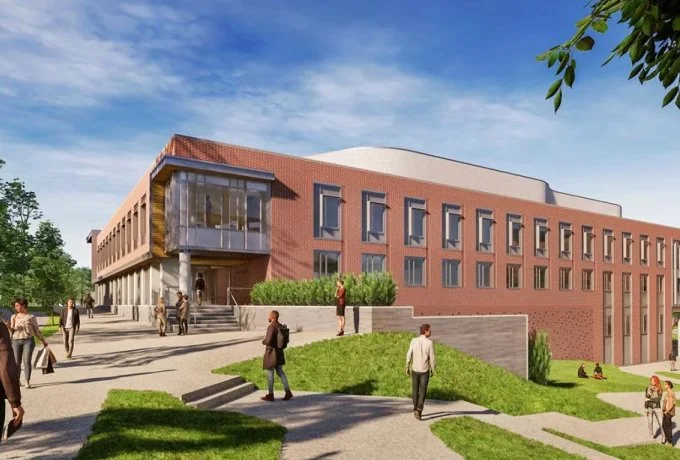NH Life Sciences Celebrates Spaulding Hall Expansion at UNH

With more than 130,000 square feet of cutting-edge teaching, research, and laboratory space, the newly expanded and renovated Spaulding Hall at the University of New Hampshire marks a milestone investment in life science education, research, and workforce development in the Granite State.
NHLS President Andrea Hechavarria joined university leaders, elected officials and industry partners at the June 6 ribbon cutting to mark the completion of the $95.5 million project — the largest capital project in the university’s history.
Built originally in 1960, Spaulding Hall was showing signs of its age and had undergone only targeted repairs leading up to the plan for the major overhaul. Like many other flagship state universities, UNH felt it needed to invest more heavily in its facilities for biological sciences.
For Hechavarria and the NHLS community, the event underscores the critical role higher education plays in developing the workforce and research capacity needed to power New Hampshire’s life sciences sector.
The Spaulding Hall project included a 47,000-square-foot addition followed by a full renovation of the original 83,000-square-foot building. The facility contains study areas, teaching labs and state-of-the-art research spaces. A new display area will house the school’s herbarium and insect collections, which are available for the public to view.
Specialized research infrastructure includes:
A cutting-edge aquatic research core supported by freshwater and saltwater labs with giant tanks and living streams
A new bioreactor core for mammalian cell culture work
An autoclave and glass wash facility for laboratory sterilization
Distributed “freezer farms” for ultra-low-temperature storage of cell lines and research materials
“With these upgrades, our students, faculty and researchers will be even better equipped to tackle the pressing challenges of our time — from improving human well-being to protecting ecosystem health and everything in between,” UNH President Elizabeth Chilton said at the event. “This building is more than bricks and mortar — it’s a launchpad for discovery and real-world impact.”
NHLS commends the university’s investment in life sciences education and research.
"It was inspiring to see the energy behind this project at the ribbon-cutting," said Hechavarria. "The technology and resources that are part of the Spaulding Hall renovation project will ensure that students receive the skills they need to enter the life sciences workforce and that UNH will play a central role in supporting the sector’s growth across the state."
Research infrastructure and providing students with pathways into science fields are of critical importance to NHLS and its member companies. New Hampshire’s workforce development and helping students succeed in their career goals are priorities for UNH, as well.
This lab will help more people access the tools and training they need to enter the life sciences.
NHLS continues to build connections between educational institutions like UNH and industry partners, so that the next generation of scientists, researchers and biotech professionals have access to the latest training and tools. Earlier this year, NHLS launched its Industry and Education Partnership (IEP). Spaulding Hall is a physical showpiece of New Hampshire’s commitment to growing life sciences. It will fuel UNH’s momentum in building a competitive life sciences education ecosystem.
Completion of the Spaulding Hall facility is timely, with the college welcoming its first cohort of Lonza Scholars in 2025. Lonza Biologics, based in Portsmouth and an NHLS member, will provide an annual scholarship to four incoming UNH students for the duration of their bachelor’s program, provided they meet performance requirements. The program also gives students access to career opportunities through paid summer internships, a Lonza employee mentor and consideration for full-time employment at Lonza upon degree completion. Lonza scientists also work with students on real-world manufacturing challenges with biologics — a class of medicines produced by living organisms.
This newly expanded and renovated facility will serve as a launchpad for discovery and groundbreaking research. NHLS is proud of UNH’s work to provide students with cutting-edge tools and real-world work opportunities. It looks forward to supporting future life science education and facilitating partnerships between academia and industry leaders.
Organizations interested in getting involved with NHLS’s Industry and Education Partnership should contact board member John Whelan at john@nhlifesciences.org, who leads the committee.
